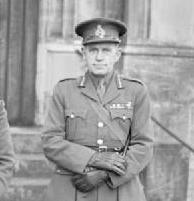Dudley Graham Johnson facts for kids
Quick facts for kids
Dudley Johnson
|
|
|---|---|

Major-General D. G. Johnson, GOC 4th Division, pictured here in 1939/1940.
|
|
| Born | 13 February 1884 Bourton-on-the-Water, Gloucestershire, England |
| Died | 21 December 1975 (aged 91) Fleet, Hampshire, England |
| Buried |
Christ Church Churchyard, Church Crookham, Fleet, Hampshire, England
|
| Allegiance | United Kingdom |
| Service/ |
British Army |
| Years of service | 1901–1944 |
| Rank | Major-General |
| Service number | 14089 |
| Unit | Wiltshire Regiment South Wales Borderers North Staffordshire Regiment |
| Commands held | Aldershot Command (1940–41) 4th Infantry Division (1938–40) Small Arms School Corps (1936–38) 12th Indian Infantry Brigade (1933–36) 2nd Battalion, North Staffordshire Regiment (1928–32) 2nd Battalion, Royal Sussex Regiment (1918–19) |
| Battles/wars | Second Boer War First World War Second World War |
| Awards | Victoria Cross Companion of the Order of the Bath Distinguished Service Order & Bar Military Cross Mentioned in Despatches |
Major-General Dudley Graham Johnson (born February 13, 1884 – died December 21, 1975) was a very brave officer in the British Army. He received the Victoria Cross, which is the highest award for courage in battle. This special medal is given to soldiers from Britain and the Commonwealth who show incredible bravery when facing the enemy. He also earned other important medals for his service.
Contents
Early Military Life and Bravery
Dudley Johnson started his military career with the Wiltshire Regiment during the Second Boer War. After finishing his training at the Royal Military College, Sandhurst in 1903, he joined the South Wales Borderers.
World War I Heroism
Johnson served in World War I, where he showed great courage. In 1915, he was awarded the Distinguished Service Order (DSO). This medal is given for excellent leadership and bravery in battle.
His first DSO was for his actions in November 1914. He showed amazing skill during an attack on German positions. He also bravely rescued several wounded soldiers while under heavy machine-gun fire.
Later in the war, he received a bar to his DSO. This means he earned the medal a second time. This was for his outstanding leadership of his battalion during an attack. Even though the ground was very difficult, his careful planning led to success. He personally made sure his team was ready after reaching their goal. He then led a night attack, moving forward a long distance against strong enemy resistance. His clever plans and actions inspired his soldiers to fight with great spirit.
The Victoria Cross Deed
Dudley Johnson was 34 years old and an acting lieutenant-colonel when he earned the Victoria Cross. This happened on November 4, 1918, during the Sambre Canal in France.
His unit was ordered to cross the canal. However, heavy enemy fire stopped the attacking groups about 100 yards from the canal. Lieutenant-Colonel Johnson arrived and personally led an attack. But the heavy fire again broke up the advance.
Showing incredible determination, he quickly reorganized his soldiers. He then led them again, and this time they successfully crossed the canal. The success of this very dangerous mission was completely due to his amazing leadership and bravery.
After the Wars
Between World War I and World War II, Johnson continued his military education. He attended the Staff College, Camberley from 1923 to 1924. He held several important teaching and staff roles.
In 1928, he became the commanding officer of the 2nd Battalion, North Staffordshire Regiment. He later commanded the 12th (Secunderabad) Infantry Brigade in 1933. From 1938 to 1940, he was the General Officer Commanding (GOC) of the 4th Division.
After the Battle of Dunkirk in June 1940, he was replaced as divisional commander. He then became the GOC of Aldershot Command later in 1940. In 1941, he became the Inspector of Infantry. He retired from the army in 1944. From 1944 to 1949, he was the Colonel of the South Wales Borderers.
His Victoria Cross medal is proudly displayed at the South Wales Borderers Museum in Brecon, Powys, Wales.
Family Life
Dudley Johnson was married to Marjorie Grisewood. Sadly, she passed away in 1950. They had one son and two daughters. After his wife's death, he spent the last 25 years of his life as a widower.
Images for kids
-
Major-General Bernard Montgomery (left), Lieutenant-General Sir Alan Brooke (centre), and Major-General Dudley Johnson (right) in France, around 1939–40.
 | Anna J. Cooper |
 | Mary McLeod Bethune |
 | Lillie Mae Bradford |


